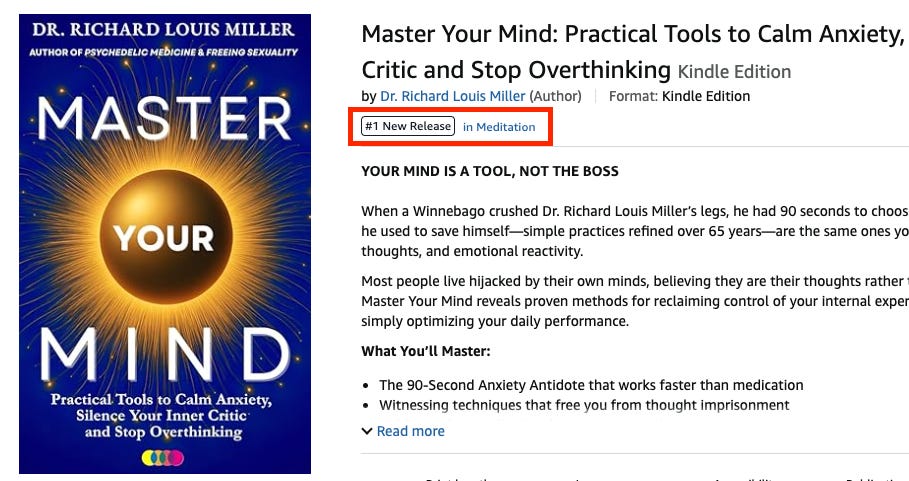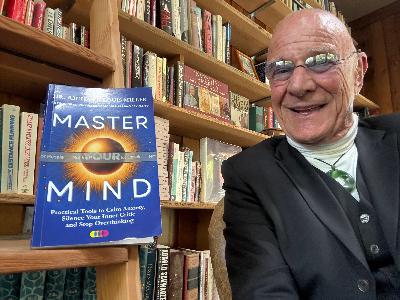The Science of Self-Compassion with Dr. Kristin Neff
Description
Dr. Kristin Neff on the Science of Self-Compassion
How self-kindness rewires your emotions, your health, and your ability to cope.
Dr. Kristin Neff — pioneering researcher, psychologist, and author of Self-Compassion — joins Mind Body Health & Politics for a deep exploration into the one skill most of us were never taught: how to treat ourselves with warmth instead of judgment.
She and Dr. Richard Louis Miller discuss why human beings evolved to be harsh toward themselves, how self-criticism keeps us stuck in a threat state, and why self-compassion isn’t “soft”—it’s a biological accelerator for resilience, calm, and emotional strength.
Kristin explains the three pillars of self-compassion, how physical touch signals safety to the nervous system, and why just 20 seconds a day of self-kindness can measurably change your mental health.She also shares deeply personal stories—from her own divorce to raising her autistic son—and how practicing self-compassion allowed her to stay grounded through fear, shame, and uncertainty.
Richard and Kristin explore mindfulness, cultural conditioning, evolutionary psychology, childhood wounds, the crisis of anxiety in America, and why being on your own side is one of the most powerful health interventions we have.
This conversation is warm, practical, and profoundly human—an invitation to finally stop being your own worst critic.
Guest
Dr. Kristin Neff — Associate Professor of Educational Psychology at the University of Texas at Austin; co-founder of the Center for Mindful Self-Compassion; author of Self-Compassion and Fierce Self-Compassion; and the world’s leading researcher on self-compassion.
Key Topics
Why we’re evolutionarily wired to be harsher with ourselves than with others
The three components of self-compassion: mindfulness, common humanity, and kindness
How physical touch activates the care system and quiets the threat system
Why self-criticism creates anxiety but does not create motivation
How self-compassion improves immune function, inflammation, cortisol, and heart-rate variability
The difference between self-compassion, self-esteem, and self-appreciation
How cultural messages (“don’t get a big head”) distort our inner voice
Using self-compassion in parenting—especially with neurodivergent children
Autism, sensitivity, and the story of her son Rowan
How shame dissolves when we remember our shared humanity
Why anxiety levels are rising nationwide—and how self-compassion protects us
Practical tools: touch, gentle self-talk, mindful awareness, and 20-second practices
How to take the Self-Compassion Scale and build a daily practice
Timestamps
00:00 — Why human beings are tribal animals, and how isolation harms us02:27 — Introducing Dr. Kristin Neff & the concept of self-compassion03:16 — What self-compassion is and is not04:07 — Treating yourself as kindly as you treat others05:35 — Why we attack ourselves: evolution, fear, and defense mode07:51 — How compassion calms the nervous system08:32 — Richard’s own journey with cancer and gratitude09:30 — Kristin’s story: divorce, shame, and discovering self-kindness11:16 — How mindfulness allows compassion to arise13:31 — The three elements of self-compassion15:11 — Common humanity vs. self-pity16:31 — How self-talk rewires the brain17:58 — Self-compassion vs. self-esteem19:36 — Self-appreciation and acknowledging what you do well21:20 — Gratitude, wisdom, and interdependence22:57 — Richard’s cancer + heart failure story23:35 — How the immune system responds to compassion26:03 — Why culture discourages self-kindness27:28 — Being harsh to ourselves: a misunderstood attempt at safety28:53 — Childhood conditioning: “don’t get a big head”30:24 — Spare the rod, spoil the child—carried into adulthood31:14 — Is self-compassion a feeling or a motivation?33:14 — The neuroscience of compassion34:55 — Ego, self, and Buddhist misunderstandings35:30 — How to apply self-compassion during suffering36:58 — The power of physical touch37:28 — Touching the body where the emotion lives40:00 — How mammals regulate through contact41:00 — Dr. Neff’s self-compassion test43:22 — Anxiety epidemic in the U.S.44:10 — AI, uncertainty, and emotional overwhelm45:27 — The “inner ally” and asking yourself, “What do I need?”47:00 — Parenting Rowan: sensitivity, autism, and Mongolia50:14 — The Horse Boy story and healing in nature53:13 — Rowan today: independence, strengths, and challenges55:27 — What autistic children teach us about attunement57:21 — One of Rowan’s best lessons: “You’re not a terrible singer—you just sing terribly.”58:06 — Why 20 seconds of self-compassion a day is enough59:04 — Richard’s excitement to share the research60:00 — Where to find Dr. Neff + closing reflections
This is a public episode. If you'd like to discuss this with other subscribers or get access to bonus episodes, visit www.mindbodyhealthpolitics.org/subscribe
























